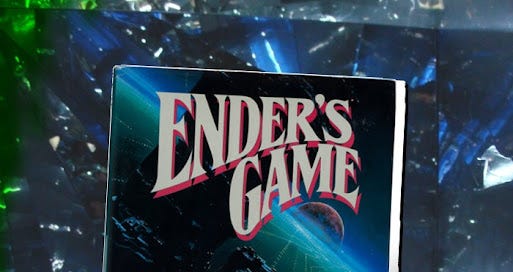Book Review: ENDER'S GAME (1985) by Orson Scott Card
First: I bear no grudge against the author or the fans of this novel. A review of the work is not a review of its readers, or its creator.
Second: ENDER’S GAME is well structured, and I completely understand why it is so popular. Readers are naturally inclined to sympathize with a lonely child protagonist who struggles against great odds. The narrative is a textbook example of how to construct a “protagonist as heroic victim.”
Also, the boy protagonist of ENDER'S GAME has an abusive childhood; you feel sorry for him. So what makes him different from, say, Harry Potter or other sci-fi/fantasy heroes with rough childhoods who are “destined to save the world”?
The difference is that this child protagonist is abused and exploited deliberately under the oversight of adults, as a program. Because they want to mold this child into a genocidal monster.
The systematic abuse is explained to be "for a greater cause" — war against aliens called "Buggers," that is. And the same adults who do this to children are too squeamish to carry out the genocide themselves — they leave the final responsibility in the hands of a little boy. (The movie version made him older, for obvious reasons.)
I’ve heard many science fiction fans describe the impact ENDER’S GAME had on them, reading the book as kids. And I get it: it impressed me too when I read it as a teenager in the 1980s. (Though even then, I noticed disturbing details that gave me second thoughts.)
The secret sauce of the book’s recipe is that Ender is a “victim-as-hero” protagonist, taken to the extreme.
The raw emotional appeal of the "victim-as-hero" trope to young readers is simply this: it fuses two contradictory opposites. Ender is depicted as both omnipotent (he beats everyone and destroys a planet) and helpless (he is manipulated and betrayed, therefore blameless).
Ender is like Rambo for nerds.
The novel’s climax, where the adult commanding officers grovel at Ender’s feet for having carried out a genocide they engineered him to accomplish, is both sickening and ludicrous. All my suspension of disbelief was lost there. I’m too cynical to swallow such a steaming ladle of sentimentality.
Has there ever, in all of human history, been an adult military commander who wanted children to steal his glory?
Cut away all the smoke and mirrors. Cut the plea bargaining about “Ender’s noble sacrifice” or his “redemption” in the sequels. What this story is really about is a convoluted argument for the necessity of child abuse — that somehow you can make a child "great" by treating it horribly.
I have a son. I know that if he were treated like the children in this book it would ruin him, not bring out the best. That is why I think this novel is wrong — simply and fundamentally wrong.
And creepy — in more ways than one. I could go on at length about creepy moments and hints in ENDER’S GAME, but I’d rather not spend more time in the company of this book.
If you enjoyed ENDER’S GAME, fine. You can read it and ignore its deeper meaning. (Something similar happened with the success of Colleen McCullough’s THE THORN BIRDS, where large audiences seemed blind to its dark subtext.)
I find the novel’s message simply perverse. So, not recommended. (Do you want these reviews to be honest or not?)
Please do not waste your time trying to argue with me in the comments; I’m done with ENDER’S GAME. If you’re a fan, you’re a fan. I can’t change you, and you can’t change me. Let’s leave it at that.
ADDENDUM: I’m not the only one who has questions about underlying themes in this book. There’s also Elaine Radford’s essay “Ender and Hitler: Sympathy For the Superman.” (1987, republished online in 2007).
Discussion about this post
No posts



